Blackjack is a casino game with a house edge and the outcome of each hand is determined by luck. Don’t expect these blackjack charts to help you make money at blackjack, but they can help you find the best possible decision in any situation.
After the basic rules of the game, a blackjack chart might be the most powerful weapon in your battle against the dealer. In fact, I’d go so far as to say that it’s impossible to play perfect blackjack without one.
If you’re looking for the best blackjack basic strategy chart to use when you play blackjack online, or want to know how to use this gold mine of information, you’ve come to the right place.
What is a blackjack chart?
Basic strategy is a set of decisions which cover every possible situation you will ever encounter at the blackjack table. With over 9 billion combinations of player and dealer cards, how could this collection of perfect plays be presented without scrambling our brains?
“Perfect blackjack can be explained in a simple chart, allowing you to find the right move in seconds”
It might not look much, but in blackjack strategy these charts contains the secret sauce that most casinos would prefer you didn’t know. PlayOJO isn’t most casinos, and we believe the more you know, the more fun it’ll be.
The most popular blackjack strategy charts
There are many combinations of blackjack rules, even at the same online casino. Each one requires its own blackjack rules chart. Although most charts have a lot in common, there are small but important variations between them.
It’s extremely hard to learn every basic strategy chart, so I recommend you pick one that covers the most common table rules you’ll encounter at your local casino or favourite online blackjack table. If you’re a UK blackjack player, you’ll probably be playing 8 deck blackjack where the dealer stands on all 17s (S17), and you can’t double after you split (NDAS).
On this page I’ve provided of the most most common blackjack hand charts. If you haven’t seen them before, here’s a quick explainer for the most common blackjack abbreviations, including an important different in blackjack split rules.
Blackjack chart terminology
| Term | Meaning |
| H17 | Dealer hits Soft 17 |
| S17 | Dealer stands Soft 17 |
| DAS | Double after split |
| NDAS | No double after split |
| H | Hit |
| S | Split |
| D | Double down |
| P | Split |
Some blackjack tables include surrender and alternative actions if the best choice isn’t available at your table (for example “Dh” for Double, stand if not allowed) but UK players will not find a table with the surrender rule very often, and 99% of tables online use standard 4-8 S17 DAS rules covered the by the table on this page.
Single deck blackjack charts
Single deck blackjack may be where it all started – the purest form of the game – but card counters effectively destroyed single-deck blackjack by eliminating the house edge, so you will do well to find a game these days. The main difference between S17 and H17 single deck blackjack strategy charts is the right move with Soft 18 v 2, and Soft 19 v 6.
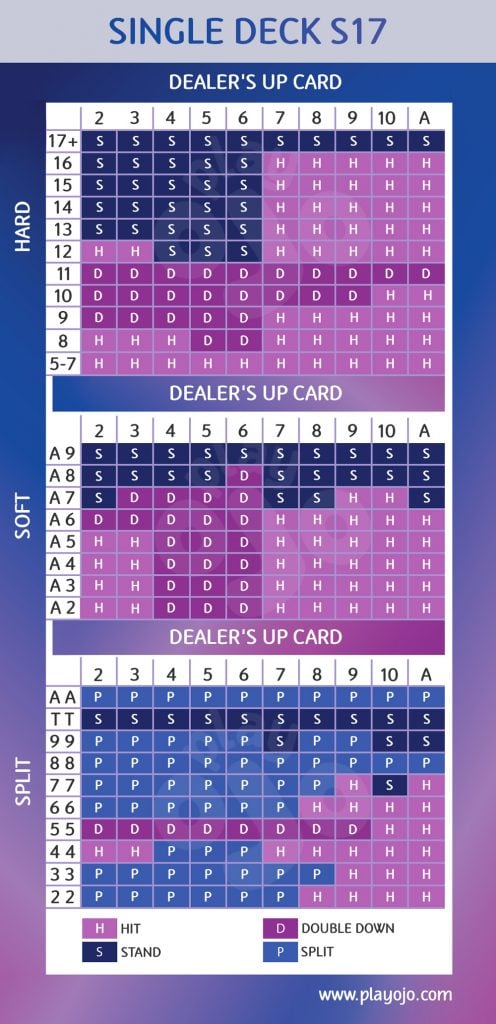
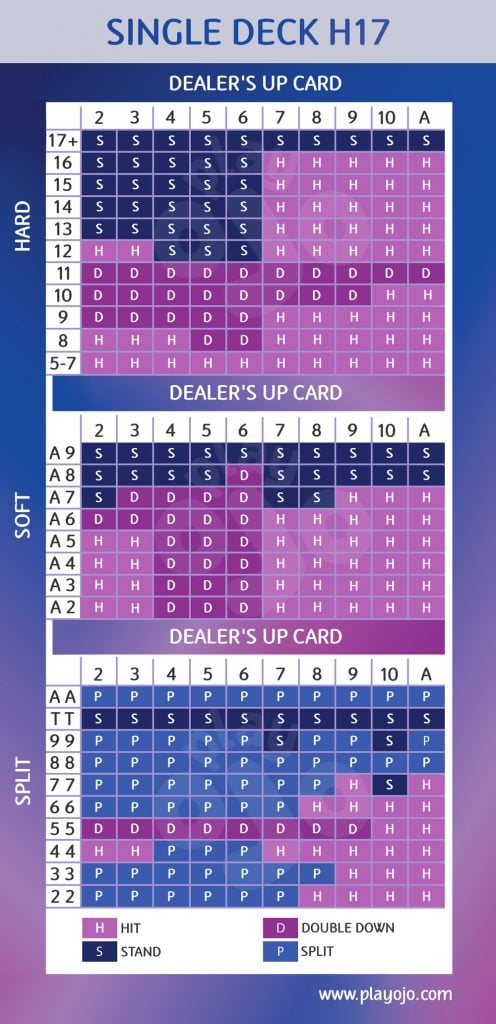
Double deck blackjack charts
The double-deck blackjack chart is identical for around 270 out of 280 decisions, but deviates from single-deck strategy in a number of situations when doubling or surrendering is possible.
The biggest deviation is with a pair of 7s, which with 2 decks should be hit against a 10, but surrendered or stand in a 1 deck game. You should also hit Soft 18 against an Ace, and double 8 v 5 or 6 if possible.
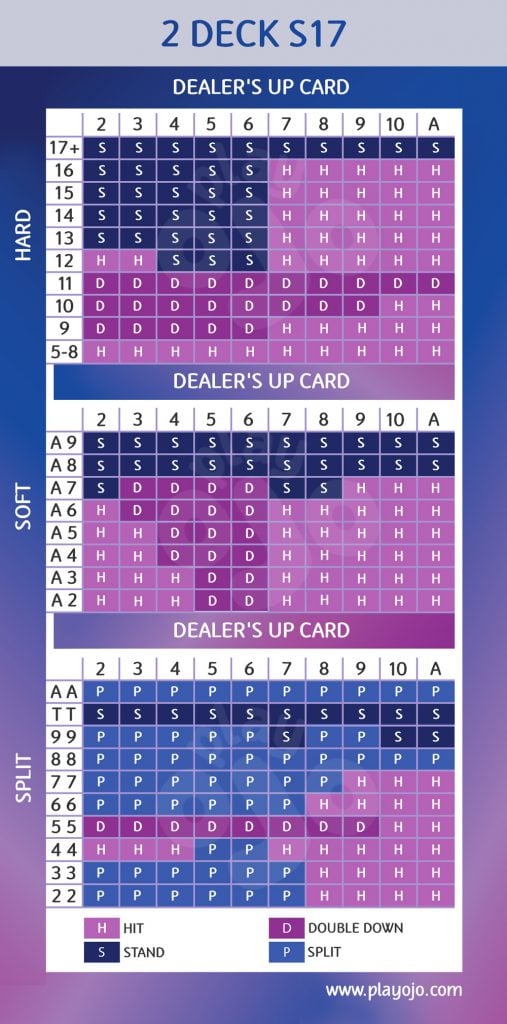
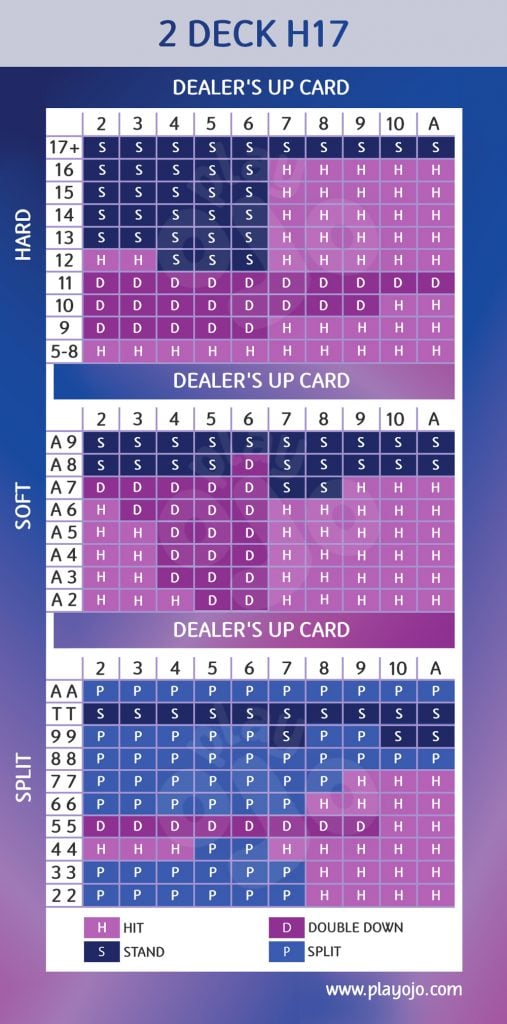
4 to 8 deck blackjack charts
The most popular blackjack hands chart uses 8 decks, so these are the charts to focus on. Although they only deviate from 1 or 2 deck charts in less than 20 instances, some of the differences are important. With 11 against a dealer’s Ace for example, you should hit rather than double.
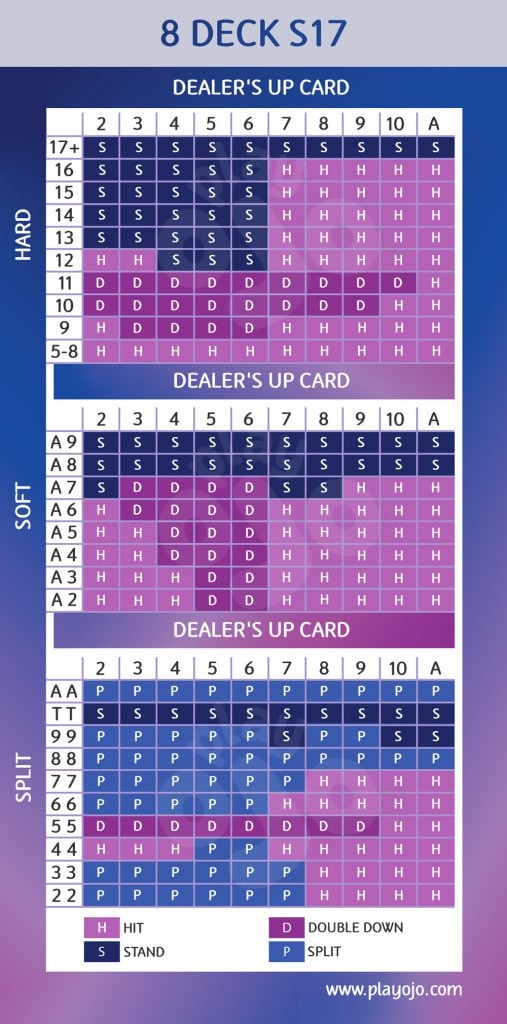
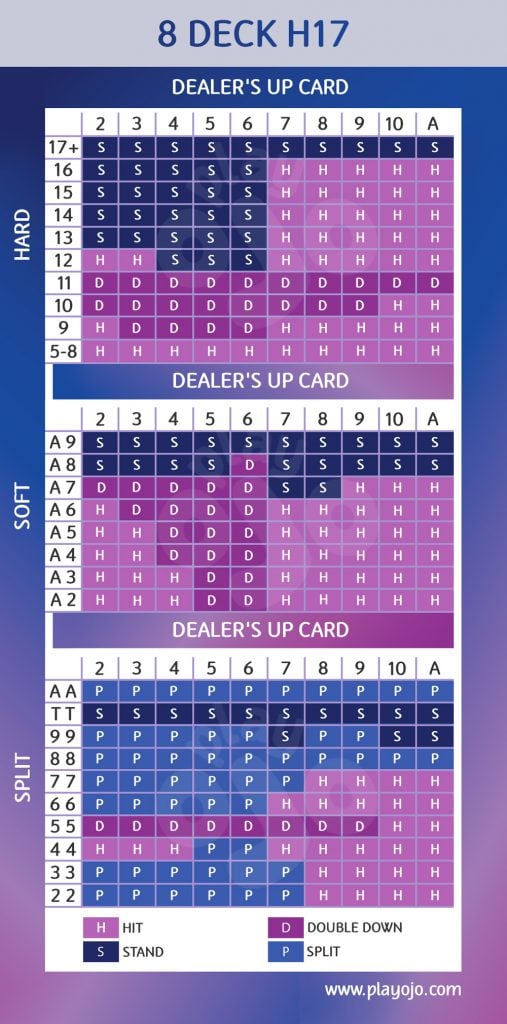
How to use a blackjack strategy chart
Down one side of the chart, you’ll find most types of player hand. Along the other side, you’ll see every possible dealer up card, from 2 to Ace.
The chart groups player hands into 3 categories; hard, soft and pairs, as the advice changes depending on the type of hand, as well as the points value. Here’s a perfect example of why the advice in basic strategy charts is different for hard hands, soft hands and pairs.
There are 3 ways to make a hand worth 14; A hard hand (for example 9-5), a soft hand (A-3) and a pair (7-7). Although all of these hands add up to 14, the correct move for an 8 deck UK blackjack table is different for all 3!

Once you’ve received your first 2 cards and you know the dealer’s up card, you’re ready to check the chart.
To play blackjack perfectly:
- Decide if your starting hand is a hard hand, soft hand or pair
- Find the row on the left hand side which matches your hand
- Find the column with the dealer’s up card at the top
- Find the square where the player row and dealer column meet – that’s your move!
That’s how you play your starting hand, and if you stand or double, you’ve reached the end of your turn. If the chart advised you to split or hit, you may still need to make more decisions. Simply keep following the chart’s advice until it recommends that you stand, or you bust.
3 hand examples using blackjack charts
For these examples we’re using the most common UK blackjack strategy chart, an 8 deck game where the dealer stands on Soft 17, NDAS and no surrender.
Hand 1
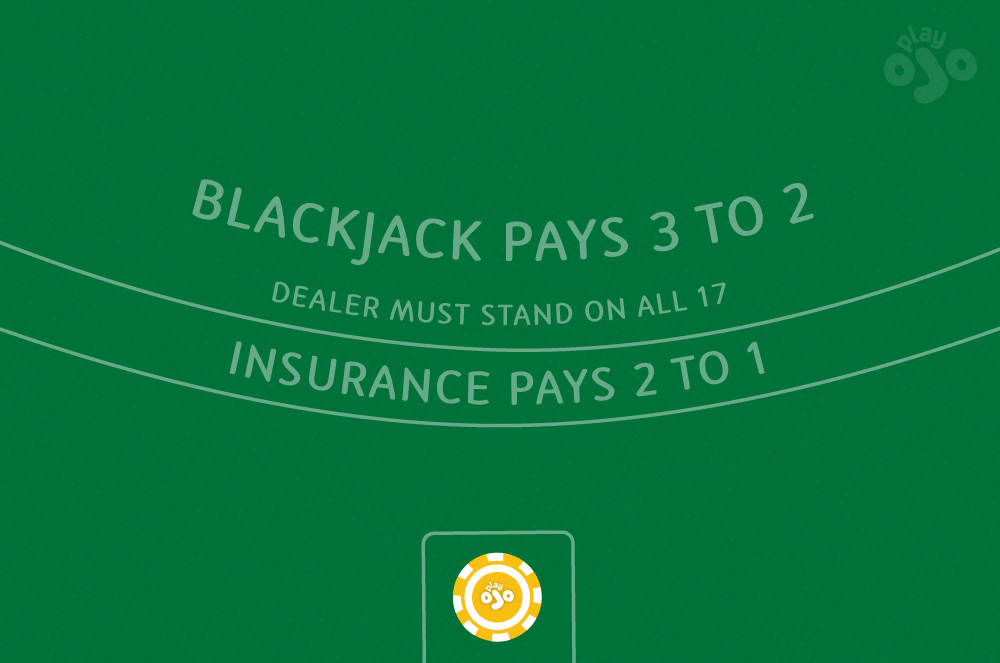
You’ve been dealt 10 against a dealer’s 9. This is a clear double down. You draw an Ace to make 21 – nice work.
Hand 2
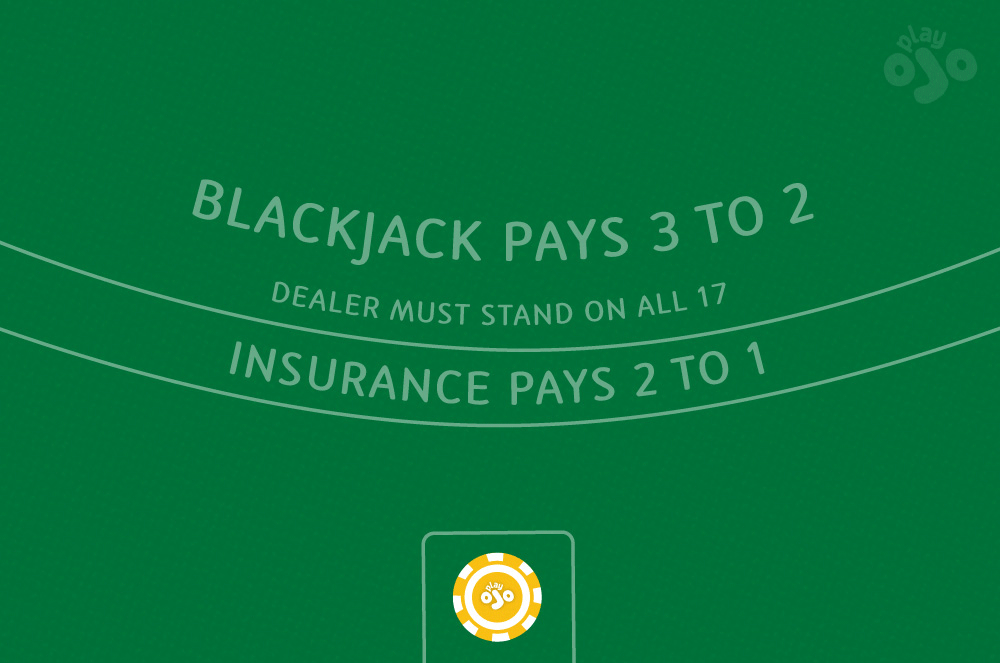
Your starting hand is worth 4 or 14, so you can safely hit without the risk of busting. You draw a 2 which makes 6 or 16. You take another card and make 12, and as the dealer has a weak 4, you stand and hope he busts.
Hand 3
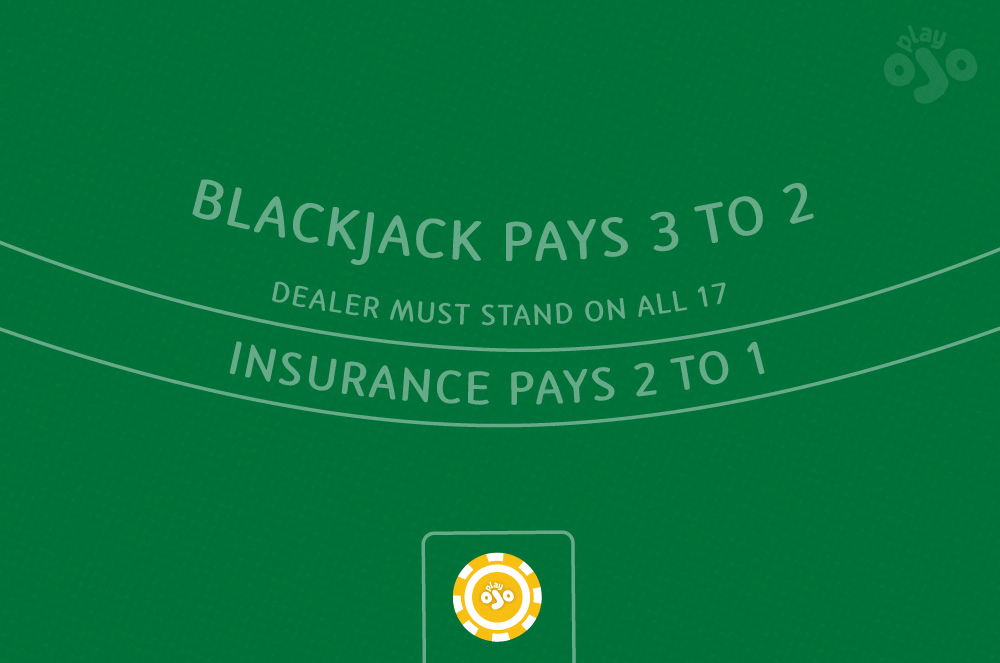
Two nines makes 18, which is a solid favourite against a 6. But the individual nines are much stronger than the dealer’s 6, so the chart advises us to split. You get to double your stake against one of the dealer’s worst cards. You make 12 and 10 or 20, and stand on both.
Summary
The basic strategy laid out in these blackjack hands charts is so fundamental to success that if you remember nothing else from our blackjack guide, the wisdom here will serve you well.
Whether you’re just starting out, taking your game to the next level or learning how to count cards, a strategy chart is your best friend. Now you know what the goal of a blackjack chart is, how to use it and which chart you’ll need when you next play.


















